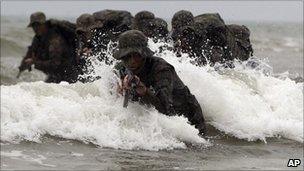North Korea fury at South Korea-US military exercise
- Published

While the South says the drill is defensive, the North says it fears an attack on its nuclear facilities
The US and South Korea have begun a joint military drill to improve combat readiness on the Korean peninsula.
The annual Ulchi Freedom Guardian exercise brings together 530,000 forces in Korea and abroad, using computer programmes to simulate war situations.
North Korea has reacted furiously to the exercises, which run for 10 days.
It called them "an undisguised military threat" and a "wanton challenge to peace" in the official Rodong Sinmum newspaper last week.
Inter-Korean relations, the article said, "are getting tenser as the days go by", and the exercises "would further aggravate the already-strained situation on the peninsula".
In a separate development, South Korea's Yonhap news agency said a source had informed it that the North had installed surveillance cameras and reinforced barbed wire along its border with China to try to stem defections and smuggling.
The measure comes after North Korean leader Kim Jong-il visited the border city of Sinuiju last month, where he accused residents of being influenced by capitalism, citing disorder and the way they dressed, the report said.
Thousands of North Koreans have escaped into China in recent years, many with the ultimate aim of defecting to South Korea. North Korea also fears smugglers bringing mobile phones, TVs and radios into the North from China are challenging Pyongyang's control.
'Iraq lessons'
The 10-day drill links bases in South Korea with US military headquarters in the Pacific and the US, reports the BBC's Lucy Williamson in Seoul.

Some South Koreans also fear the exercise will heighten tensions
This year, local media say the training will shift more responsibility from the joint command to South Korean military chiefs, to prepare for the handover of war-time operational authority in 2015.
The commander of US-South Korean forces, US Gen James D Thurman, said they were "applying lessons learned out of Iraq and Afghanistan" in the training exercises, "as well as those garnered by the Alliance's recent experiences with North Korean provocations on the peninsula".
A spokesman for the force said troops would train for a "wide variety of missions including those involving the location and security of chemical, biological, nuclear and radiological threats", reported AFP news agency.
The North, meanwhile, depicted the exercise as "realistic war drill to remove our nuclear facilities with a mobile unit" - seeking to bring war to the Korean peninsula as a way to "extricate itself from its worsening economic crisis".
In an open letter last week, Pyongyang called for a peace-keeping mechanism to replace the armistice that ended the 1950-53 Korean war.
North Korea's nuclear envoy has held talks with both South Korea and the US in recent weeks, to try to find a way back to six-party talks on North Korea's nuclear programme last held in late 2008.
But relations between the two Koreas are still fragile, after two attacks on the South last year, our correspondent says.